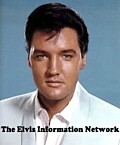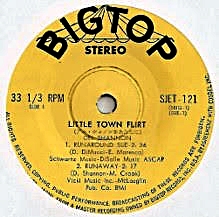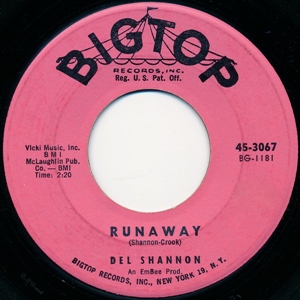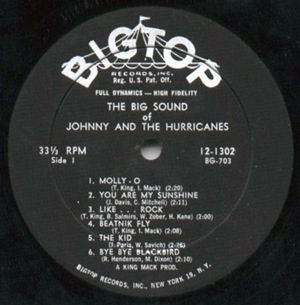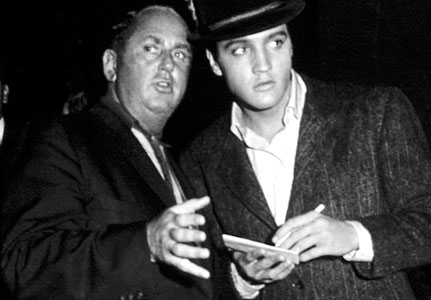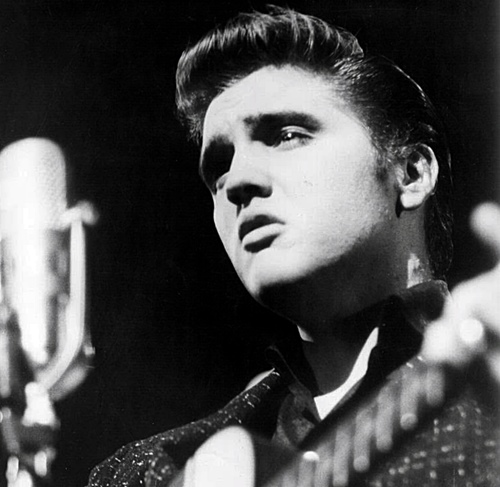 |
 |

Spotlight article prepared by Nigel Patterson, September 2019 In Ripley's Believe It or Not! tradition, this is the obscure but true account of how Bigtop Records set out, with Colonel Parker in its corner?, to lure Elvis away from RCA. While Bigtop Records is a little known label from the late 1950s-1960s it almost became, not only Elvis’ "recording" home, but also almost part-owned by the King!
About Bigtop Records Bigtop Records was an American record label founded in 1958 by the Hill & Range Music organisation, controlled by Austrian-Swiss brothers, Julian and Jean Aberbach, and managed by brothers, Johnny and Freddy Bienstock. The launch of Bigtop Records signified that Hill & Range Music was the first of the major independent music publishing companies to recognise the importance of the rock ‘n’ roll age and the decline of sheet music sales. John Brovin, in his fascinating book, Record Makers and Breakers, comments:
Bigtop’s first minor hit was White Bucks and Saddle Shoes (sung by Bobby Pedrick Jr.), written by Hill & Range staffers, Doc Pomus and Mort Shuman. The song peaked at #74 and ‘sold records’. The first bona fide big hit for Bigtop was Sammy Turner’s Lavender Blue (Dilly, Dilly), which peaked at #3 in the summer of 1959. The success of Lavender Blue has an interesting back-story. Johnny Bienstock became good friends with Dick Clark (American Bandstand). Johnny tells the story:
Johnny Wienstock managed to get Lavender Blue played on the three “black” radio stations in Philadelphia and when he got it played on WFIL (where Clark had started out as a disc jockey), it became a hit. Johnny saw Dick Clark a week later, and said, “Look, I got you surrounded…Without you playing it on the big nationwide show, I’ve already sold about 100,000.” “Wow,” he says, “I’m going on it.” Sammy Turner’s follow-up record on Bigtop, Always, was a top 20 hit. By 1960, BigTop had a sterling roster and was responsible for a number of major hit records. Among its successes were the Del Shannon hits, Runaway (a #1 hit), Hats Off To Larry (#5), Little Town Flirt (#12) and The Swiss Maid, Sheik of Araby (Johnny and the Hurricanes), Pretty Little Angel Eyes (Curtis Lee) and Corrina, Corrina (Ray Peterson) – the latter two, both top 10 hits, were produced by one Phil Spector on the Dune’s Records label and distributed by Bigtop on a 50:50 profit sharing basis. (Sir) Cliff Richard’s 1962 hit, The Young Ones, was also distributed in the US by Bigtop.
More BigTop vinyl including Del Shannon's Runaway that Elvis would later perform live in concert
Other artists on Bigtop’s roster included Toni Fisher (West of the Wall #37), Don and Juan, O.C. Smith (who would in the late 1960s score hits, including Hickory Holler's Tramp and Little Green Apples, recording for Columbia Records), The Cottontails, Dotty Clark, Lou Johnson, and Australian artists, Rob E.G. (Jezebel), Jimmy Little (Royal Telephone), and Lucky Starr (Cuddle Closer). Bigtop also released two Mad magazine music parody themed albums: Mad Twists Rock 'N' Roll and Fink Along With Mad in 1963. A subsidiary company, Big Hill Records, operated briefly after Bigtop closed in 1965. Bigtop Records music is currently licensed in the UK to Ace Records. Between 1961 and 1963 Bigtop Records had nine Hot 100 hits (Billboard). In Britain, where Bigtop licensed their recordings to be released on the London label, they were even more successful, also scoring with four Top 20 hits (on the New Musical Express chart) with "a sax-organ combo, fronted by Johnny Paris".....Johnny and the Hurricanes. While Bigtop primarily focused on 7” singles (they being the norm at that time) it also released numerous 12” LPs, Dell Shannon’s Runaway (a flop on the charts) and Little Town Flirt (#12) albums, and The Big Sound of Johnny and the Hurricanes, among them.
Elvis, the Colonel and Bigtop The name Bigtop was derived from Colonel Parker. Freddy Bienstock tells the story:
So could Elvis really have left RCA and joined Bigtop? Freddy Bienstock has stated:
John Broven, continues the story: ‘This almost fanciful story was confirmed by Johnny Bienstock:
But as Brovin, notes, it never happened. One can only imagine what it would have meant for Elvis’ career had he left RCA and joined Bigtop Records. End notes 1. While Bigtop Records was never the success the Auberbach's likely desired, it had its share of "hit records". The end for Bigtop Records came in 1965, a victim of the changing music landscape with the "British Invasion", and the Auberbach's losing interest in promoting the label. Still, the label will forever be an obscure, Ripley's Believe It or Not!, footnote in the multi-faceted and gloried story of Elvis Presley. 2. One of the best CD releases covering the Bigtop Records recordings is the 2 disc set, High Voltage The Big Top Records Story, released by One Day Music in the UK in 2013. The set (available from Amazon US and UK at a low price) is a great blend of 50 rock 'n' roll and ballads including Runaway, Hats Off To Larry, The Swiss Maid and Little Town Flirt from Del Shannon, Johnny & the Hurricane's Rocking Goose and High Voltage, Lavender Blue and Always (Sammy Turner), The Treasure In My Heart (Joey & The Ambers), That's A Step In The Right Direction (Dottie Clarke), Castle In The Sky (Gerri Granger), White Bucks and Saddle Shoes (Bobby Pedrick Jr.) Jilted (Spencer Stirling), Fever (Kenny Martin), Baby You've Got It Made (Rocky Hart & The Passions), Red Hot (The Royal Jokers), and I Love Like You Do (The Parakeets). There are many little known recordings which are aurally, very pleasing.
Sources: Broven, John, Record Makers and Breakers Voices of Independent Rock ‘N’ Roll Pioneers, University of Illinois Press, 2009, ISBN-13: 978-0252032905 discogs.com, Bigtop Records soulfulkindamusic.net, Big Top (discography) Wikipedia, Bigtop Records
|
|
